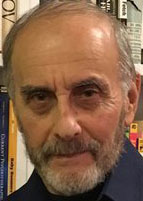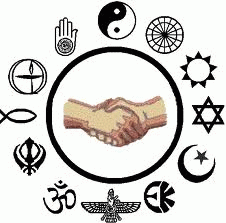Since the beginnings of formal religions, prophets and mystics have been predicting the spiritual transformation of mankind, a transformation that will usher in an age of peace and harmony. In Judaism, for example, a long-standing tradition holds that a Messiah will
Some Christians believe in the "Rapture," a cataclysmic event
Yet we must be cautious in buying into these predictions. Consider Groucho Marx's famous quip when he was caught in a compromising position: "Who are you gonna believe, me or your own eyes?" Today what we see with our own eyes is nothing to cheer about. The horrific events that we read about and view in vivid television reports hardly testify to an imminent state of spiritual elevation. Conflict, greed, self-interest, divisiveness, warfare and even genocide are as prevalent on the world stage today as they have ever been. Even religions and sects of religions that worship the same God are torn by strife and violence.
So when I first heard about the new book by Kurt Johnson and David Robert Ord, The Coming Interspiritual Age, I was understandably skeptical. But when I read the endorsements by notables like Ken Wilbur, Andrew Harvey and Matthew Fox, I thought, "Maybe Johnson and Ord are on to something." And indeed they are.
Kurt Johnson, a monastic for more than a decade who later became an evolutionary biologist, and David Robert Ord, a Presbyterian minster bring both a spiritual and scientific perspective to their vision of a new spiritual age. Inspiration for their book was sparked by the teachings and writngs of Catholic Brother Wayne Teasdale. Johnson was a close associate of Teasdale, who coined the words "interspirituality" and "interspiritual age" in 1999 in his now classic book The Mystic Heart: Discovering a Universal Spirituality in the World's Religions. Teasdale, Thomas Merton, Raimon Panikkar, Matthew Fox and other western ecumenical thinkers began their work in response to the call of the historical Vatican II Council (1962-1965), which spawned a new dialogue across all of the world's religions, a process richly described by Johnson and Ord.
After setting down basic principles, The Coming Interspiritual Age takes the reader on a panoramic journey through human history, showing that discoveries and innovations have always co-existed with destructive forces. They point out that our progress from the cave to space travel over a relatively short time is no small accomplishment but that despite this stunning achievement, humans have been sloshing through a quagmire of base emotions and I-me driven motives. That will change, they argue, because conditions today are setting the stage for radical progress in the spiritual domain
Yes, we are on the threshold of a new interspiritual age, say Johnson and Ord, brought about by a confluence of world events, cultural changes, the technological revolution, and eight paradigm shifts that include: "undoing the bonds of loyalty to clan, nation, religion, and skin color, along with abstaining from violence to solve problems, coupled with the dream of moving toward holistic, heartistic, trans-traditional, transcultural, and transnational perspectives."
Contributing to the likelihood of this new age is that fact that science is loosening its long-standing commitment to rigid materialism and reductionism in favor of "an all-inclusive quantum reality in which everything is made of the same thing." These changes are moving human consciousness toward a we-oneness universal state and away from the I-me consciousness that has hampered our spiritual growth.
Does oneness mean an end to diversity? Not at all, insist Johnson and Ord. Diversity, they explain, is a fundamental principle of nature. The task for humans is to find the unity within diversity. Only by doing this will we ultimately promote human survival. How to accomplish this ambitious goal? The authors offer no one-size-fits-all answer. They call on individuals, religious and spiritual groups, and world leaders to embrace the principle of oneness. With that firm conviction in place, Johnson and Ord are convinced that finding and articulating oneness in the diversity of life circumstances will flow naturally -- and the solutions will reflect diversity as well.
Is the interspiritual age guaranteed to come about? Johnson and Ord are not starry-eyed dreamers. They are fully aware of the obstacles and are mindful of the critical question: Will the rise in consciousness of the interspiritual age accelerate fast enough to beat the rising seas and other forces that threaten the viability of the planet and human existence? Johnson and Ord offer hopeful evidence to support an enthusiastic "yes" to this question.






